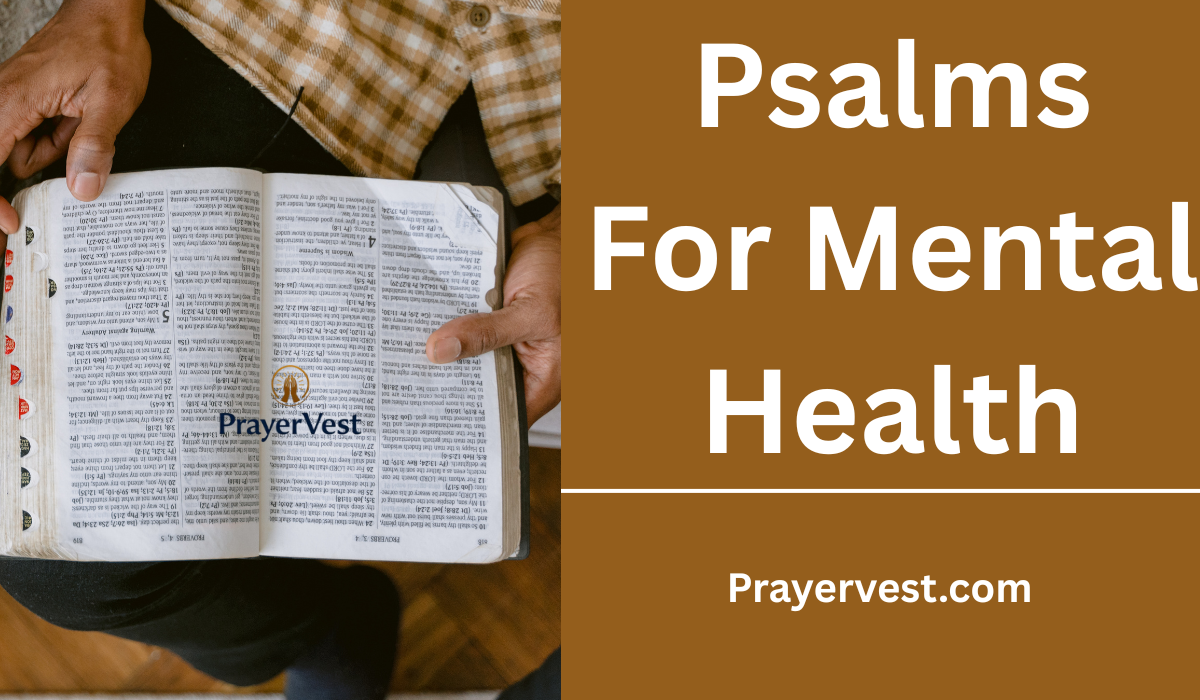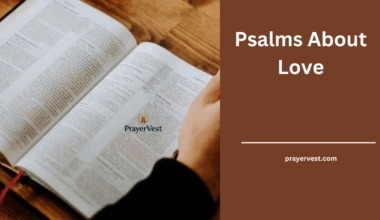Psalms For Mental Health. The state of our mental health has emerged as one of the most urgent issues of our day in a world that frequently seems overwhelming and uncertain. Burnout, emotional tiredness, despair, and anxiety are no longer uncommon occurrences; for many people, they are now a normal part of life.
In certain situations, we might find it difficult to put our suffering, hope, or perplexity into words. However, the book of Psalms offers a haven—a place where unadulterated passion and heavenly truth collide, and where weak hearts can find words for both adoration and mourning.
The Psalms are profoundly human sentiments of pleasure, sadness, longing, fear, and faith that go beyond simple archaic poetry. Psalmists like King David did not hesitate to confide in God about their inner agony. They struggled with grief, questioned the quiet of heaven, and screamed in the dark.
Nevertheless, we discover unwavering hope in those same verses—hope that is based on the nature of a dependable and kind God rather than on external circumstances. The Psalms are a mirror and a comfort to individuals who are dealing with mental health issues because they remind us that God is deeply present in the depths of our emotional distress and that we are not alone in our struggle.


The goal of reading the Psalms for mental health is to have an open, healing conversation with God rather than to look for quick fixes. We are given the license to feel, to cry, to doubt, and to trust once more by these holy poems. They shift our attention from the instability within to the stable haven of God’s presence. The Psalms provide a path—one of healing, tranquility, and unwavering hope—whether you’re going through a period of emotional vulnerability or are just looking for daily rejuvenation for your mind and spirit.
50 Powerful Psalms For Mental Health (2026)
1. Psalm 34:17
“The righteous cry out, and the Lord hears them; he delivers them from all their troubles.”
This verse emphasizes God’s attentiveness to the cries of those who seek Him. In times of mental distress—whether anxiety, depression, or emotional fatigue—God promises to not only listen but to act. He is not indifferent to our anguish. The image here is one of divine rescue: a God who bends down to the hurting and offers deliverance from emotional and psychological burdens.
Reflection
Mental health battles often feel lonely and overwhelming. This verse reminds us that our cries are not lost in the void; they are heard by a compassionate God who cares deeply. Even when no one else understands, God sees the full weight of what we carry and offers rescue in His time and way. This is not a promise of instant relief, but of certain presence. Crying out to God becomes a sacred lifeline—an act of faith that opens the door to divine healing and peace.
2. Psalm 42:11
“Why, my soul, are you downcast? Why so disturbed within me? Put your hope in God, for I will yet praise him, my Savior and my God.”
This psalm captures a deeply personal dialogue between the psalmist and his soul. It acknowledges the reality of inner turmoil while also prescribing a solution: redirecting despair toward hope in God. The verse recognizes emotional distress but calls for perseverance through praise and spiritual resilience.
Reflection
Sometimes our minds spiral into sadness or anxiety without a clear cause, and like the psalmist, we must learn to speak truth to ourselves. This verse gives us a model of mental self-care rooted in faith, acknowledging the disturbance but also reminding our soul of where true hope lies. The act of praise isn’t just worship; it’s also therapy for the spirit. When emotions sink, lifting our hearts in praise reorients us to God’s promises and lifts us from internal darkness.
3. Psalm 147:3
“He heals the brokenhearted and binds up their wounds.”
God is portrayed here not just as a healer of physical ailments but of emotional and psychological wounds. The verse offers a vision of divine care for those crushed by grief, heartbreak, or inner turmoil. God’s tenderness is on display as He carefully tends to the unseen injuries of the heart.
Reflection
Mental health struggles are often invisible to the world, but never to God. When life breaks us, we serve a God who doesn’t recoil or ignore our pain. Instead, He draws near, acting as the divine physician to tend our emotional wounds. This verse invites us to bring our most painful, raw emotions to God, not to hide them, but to let Him heal them. In His presence, no wound is too deep, and no heart is too shattered to be restored.
4. Psalm 61:2
“From the ends of the earth I call to you, I call as my heart grows faint; lead me to the rock that is higher than I.”
This verse is a cry of desperation and longing from the psalmist, who feels emotionally exhausted and distant. Yet, it is also a declaration of trust, asking God to provide a stable and secure refuge amid mental and emotional weakness. The “rock that is higher” symbolizes strength, clarity, and safety beyond human reach.
Reflection
When our hearts grow faint and life feels unmanageable, God offers something better than escape—He offers elevation. He lifts us to a place of perspective, peace, and strength that we cannot reach on our own. This verse invites us to call out even when we’re barely holding on. There’s comfort in knowing that we’re not asked to climb to God—He comes to lead us up. Mental health recovery often begins by admitting our frailty and letting God place us on a firmer foundation than our feelings.
5. Psalm 94:19
“When anxiety was great within me, your consolation brought me joy.”
This verse directly addresses anxiety and the inner turmoil it brings. The psalmist does not pretend anxiety is absent but confesses its presence—and finds relief through the comfort God provides. It’s a powerful testimony of divine intervention that replaces inner chaos with joy.
Reflection
Anxiety has a way of multiplying thoughts until they drown out peace. But God speaks calmly into our confusion. His comfort isn’t theoretical—it’s experiential. This verse teaches us that joy is still possible even when anxiety persists. The path to mental health may not be instant, but God’s consolation is constant. In moments of panic or worry, we are invited to sink into the arms of a God whose peace surpasses understanding. His joy doesn’t ignore the pain; it enters and transforms it.
6. Psalm 23:3
“He restores my soul. He guides me in paths of righteousness for his name’s sake.”
This beloved verse speaks of deep, holistic restoration. The soul—often the very seat of mental and emotional processing—is not forgotten by God. Restoration here means refreshment, healing, and realignment with purpose. It also involves divine guidance through healthy paths, which is essential for mental wellness.
Reflection
Sometimes our souls are not broken by tragedy, but by exhaustion, confusion, or hopelessness. This verse is God’s promise that He not only understands our soul’s depletion but actively restores it. True healing comes when we let the Shepherd lead us out of overthinking, out of self-reliance, and into His rest. In a world of burnout and brokenness, this verse becomes our permission to stop striving and allow God to renew us from the inside out.
7. Psalm 30:5
“Weeping may endure for a night, but joy comes in the morning.”
This verse recognizes the reality of pain and sorrow but anchors the heart in the assurance of coming joy. It doesn’t invalidate the present struggle but places it within the framework of hope. Emotional darkness is temporary when viewed in light of God’s restorative timing.
Reflection
Mental health struggles can feel like a never-ending night. But this verse declares that emotional storms are not permanent. God has a sunrise for every soul. Morning may not arrive at the clock’s demand, but it is divinely appointed. This verse teaches us to sit with our sorrow while still anticipating joy. Healing may be slow, but it is certain. God transforms grief into gladness and despair into dawn.
8. Psalm 46:1
“God is our refuge and strength, an ever-present help in trouble.”
This powerful verse affirms God’s active presence during times of crisis. Whether mental, emotional, or spiritual distress, God is not distant. He is both refuge—our place of protection—and strength—the energy we need to endure. His presence is consistent, even when our emotions are not.
Reflection
Mental health journeys are filled with ups and downs, but this verse is a steady anchor. It doesn’t promise a life free from trouble but assures us of divine help *within* it. Sometimes, the most healing thing we can know is that we’re not alone in the fight. God is both shelter and sustainer. We don’t have to pretend to be strong—His strength is available in our weakness, and His presence is unwavering even in our most fragile moments.
9. Psalm 143:7-8
“Answer me quickly, Lord; my spirit fails… Let the morning bring me word of your unfailing love, for I have put my trust in you.”
These verses depict someone in deep mental and emotional distress, crying out for quick intervention. Yet the psalmist places hope in the morning and the enduring love of God. Trust is not in circumstances, but in divine character.
Reflection
When we feel like we’re fading, this psalm becomes our honest prayer. Mental health challenges can make it seem like morning will never come. But even in desperation, this verse models how to trust in the unseen faithfulness of God. We are allowed to beg for help and still believe in His goodness. There is healing in simply asking God to show up—and trusting that He will. Every new day becomes a canvas for fresh mercy and evidence of God’s enduring love.
10. Psalm 55:22
“Cast your cares on the Lord and he will sustain you; he will never let the righteous be shaken.”
This verse encourages us to release our emotional burdens to God, with the assurance that He will support us. It implies that divine sustenance is available when we surrender, not when we strive. God’s faithfulness acts as a stabilizing force for those in mental turmoil.
Reflection
Carrying anxiety, depression, or emotional distress is not a badge of strength—it’s a weight we were never meant to bear alone. This verse invites us to transfer that load into God’s hands. We may not be able to fix our mental state in a moment, but we *can* hand our worries to a God who never grows tired. He sustains what we surrender. This isn’t about avoiding emotions—it’s about trusting someone strong enough to carry them with us.
11. Psalm 27:1
“The Lord is my light and my salvation—whom shall I fear? The Lord is the stronghold of my life—of whom shall I be afraid?”
This verse is a bold declaration of trust and security in God. Fear often underlies many mental health struggles—fear of failure, rejection, loss, or simply the unknown. But the psalmist counters that fear with the truth of who God is: a light in darkness, a Savior in danger, and a stronghold when everything else feels unstable.
Reflection
When anxiety or panic rises, our minds often reach for control. But this verse reminds us that peace comes not from control, but from confidence in God’s power. Declaring God as our light displaces the shadows of fear. Mental wellness grows stronger when we lean into God’s identity more than our instability. He doesn’t just help us *through* fear—He replaces it with security.
12. Psalm 40:1-2
“I waited patiently for the Lord; he turned to me and heard my cry. He lifted me out of the slimy pit… he set my feet on a rock and gave me a firm place to stand.”
These verses describe a personal testimony of someone who cried out in despair and was met with divine intervention. The imagery of a “slimy pit” is vivid, capturing the helplessness and hopelessness that often come with depression or anxiety. God doesn’t just listen—He rescues and stabilizes.
Reflection
Mental health struggles can feel like being stuck, trapped in thoughts or emotions you can’t shake. But this Psalm offers hope that God doesn’t leave us in the pit. His rescue is personal. He doesn’t just throw us a rope; He lifts us, sets us on solid ground, and helps us walk again. Even if your progress feels slow, remember this: God specializes in giving firm footing where fear once ruled.
13. Psalm 73:26
“My flesh and my heart may fail, but God is the strength of my heart and my portion forever.”
This verse acknowledges human frailty, both physical and emotional. But it doesn’t end there. It shifts attention to God’s strength as the true sustainer of the heart. When our inner world collapses, God becomes our foundation.
Reflection
When you’re mentally or emotionally drained, it’s comforting to know that your limitations don’t limit God’s ability to hold you up. This verse permits to admit when your heart is failing. It reframes weakness, not as failure, but as an opportunity to rely fully on God’s unfailing strength. Mental healing doesn’t require personal perfection—only a humble dependence on a God who never fails.
14. Psalm 139:23-24
“Search me, God, and know my heart; test me and know my anxious thoughts. See if there is any offensive way in me and lead me in the way everlasting.”
This is a vulnerable prayer that invites God into the deepest parts of the mind and heart, including anxious thoughts. The psalmist doesn’t try to hide inner turmoil but offers it to God for examination and redirection.
Reflection
Mental clarity often begins with spiritual honesty. This verse teaches us that true healing requires letting God examine the parts we usually try to avoid or suppress. Anxiety, fear, intrusive thoughts—none of these are too dark for God’s light. By inviting Him in, we begin a journey not just toward peace, but toward transformation. Sometimes the first step in healing is simply saying, “God, please see me.”
15. Psalm 16:8
“I keep my eyes always on the Lord. With him at my right hand, I will not be shaken.”
This verse offers a mental strategy grounded in spiritual focus. Keeping one’s gaze fixed on God, especially in the middle of mental unrest, cultivates stability. The right hand represents closeness and support—a symbol of God’s intimate nearness.
Reflection
Mental storms often begin with where our focus rests. When we fixate on fears or failures, anxiety multiplies. But when we turn our eyes to God, our perspective shifts. His presence at our right hand is not symbolic—it’s experiential. This verse teaches us that unshakable peace isn’t the absence of problems, but the presence of God. Stability begins when we intentionally anchor our thoughts in Him.
16. Psalm 31:7
“I will be glad and rejoice in your love, for you saw my affliction and knew the anguish of my soul.”
This verse acknowledges both the pain of inner anguish and the comfort of being seen by God. There’s joy—not because suffering disappears, but because the sufferer is not invisible. God fully understands and engages with our emotional pain.
Reflection
There’s something profoundly healing about being *seen* in your suffering. Mental anguish often makes us feel isolated or misunderstood. But this verse reminds us that God not only notices our pain—He intimately understands it. That awareness turns suffering from silent to sacred. We can rejoice in His love not because our soul isn’t aching, but because He enters that ache with compassion.
17. Psalm 32:7
“You are my hiding place; you will protect me from trouble and surround me with songs of deliverance.”
This verse provides a beautiful metaphor for emotional refuge. God is not just a protector from external enemies—He becomes the quiet sanctuary for internal chaos. His deliverance is not just functional—it’s melodic, calming the soul.
Reflection
In times of anxiety or panic, we often crave a place to hide—a mental escape. This verse offers something better: a holy hiding place in the presence of God. Here, we are not forgotten or dismissed—we are surrounded by songs of deliverance. God doesn’t just defend us; He sings over us, calming our inner world with His presence. In His refuge, fear cannot stay loud.
18. Psalm 118:5-6
“When hard pressed, I cried to the Lord; he brought me into a spacious place. The Lord is with me; I will not be afraid.”
This passage testifies to a God who transforms constriction into freedom. The imagery of a “spacious place” contrasts sharply with the suffocation many feel during mental health crises. God hears, responds, and expands our emotional and spiritual space.
Reflection
Mental pressure can feel like being trapped in a shrinking room. But God doesn’t just open the door—He leads us into wide, freeing spaces. He makes room for peace, clarity, and breath again. The psalmist’s confidence isn’t rooted in inner strength, but in divine presence. When God is with us, fear begins to loosen its grip. Spaciousness returns where anxiety once dominated.
19. Psalm 6:6
“I am worn out from my groaning. All night long I flood my bed with weeping and drench my couch with tears.”
This raw and honest verse expresses the depths of emotional exhaustion. There is no attempt to mask the pain—it’s laid bare. Yet this vulnerability is sacred because it’s part of Scripture, showing us that God welcomes the full spectrum of human emotion.
Reflection
Mental health often involves sleepless nights and silent suffering. This verse gives voice to what many feel but hesitate to say. It’s a reminder that God allows—and even invites—emotional honesty. There’s no shame in tears. They don’t disqualify us from faith; they deepen it. In every groan and tear, God draws near. Healing begins with permission to be human before a holy God.
20. Psalm 126:5
“Those who sow with tears will reap with songs of joy.”
This poetic verse promises that sorrow is not the end of the story. Tears are not wasted; they are seeds. God promises that what is sown in pain will, in His time, be harvested in joy. This is not a denial of hardship—it’s an assurance of redemption.
Reflection
When navigating mental health challenges, it’s easy to believe that the suffering has no purpose. But this verse reframes tears as part of a sacred process. They are seeds of healing, of joy yet to come. Even if the harvest takes time, God assures us that joy is on the way. Keep sowing—through therapy, through prayer, through honest conversation. Your tears matter, and in God’s hands, they will produce beauty.
21. Psalm 3:3
“But you, Lord, are a shield around me, my glory, the One who lifts my head high.”
This verse is a bold declaration of God’s protective and uplifting presence. When our heads hang low from discouragement, depression, or shame, God doesn’t just guard us—He restores our dignity and gently lifts our heads.
Reflection
Mental health struggles often weigh us down—not just emotionally, but physically. Our shoulders slump, our eyes fall, and our heads hang. But God doesn’t just offer distant protection—He gets close. He lifts us. This verse offers more than defense; it offers restoration. It reminds us that God sees our heaviness and actively works to raise us from it, emotionally, spiritually, and mentally.
22. Psalm 18:28
“You, Lord, keep my lamp burning; my God turns my darkness into light.”
In this verse, God is portrayed as the sustainer of hope. Even when darkness surrounds or invades the mind, God is capable of reversing it, transforming despair into illumination, and burnout into renewed energy.
Reflection
Mental darkness can feel eternal, like the flame of joy or hope has gone out. But God doesn’t just light the fire once; He keeps it burning. He breathes life into our flickering faith and emotional weariness. This verse is a quiet promise that darkness is not the final word. Light is coming—and in Christ, it never goes out.
23. Psalm 9:9
“The Lord is a refuge for the oppressed, a stronghold in times of trouble.”
This verse highlights God’s identity as a safe place for those feeling mentally and emotionally burdened. He is not a distant observer of suffering—He is a stronghold, a place to hide and heal.
Reflection
When our minds feel attacked by fear, intrusive thoughts, or depression, God becomes our mental sanctuary. This verse invites us to see Him not just as Savior, but as Shelter. In Him, we can find space to breathe, recover, and be renewed. He is a stronghold—not to trap us, but to protect us while we heal.
24. Psalm 19:14
“May these words of my mouth and this meditation of my heart be pleasing in your sight, Lord, my Rock and my Redeemer.”
Here, the psalmist reflects on both speech and thought, asking that even internal meditations be pleasing to God. It reminds us that mental health is tied closely to what we think and dwell upon, and that God is present in even our private thoughts.
Reflection
Mental wellness often involves disciplining our inner dialogue. What we meditate on shapes our emotions. This verse is an invitation to bring even our hidden thoughts to God for alignment, healing, and transformation. It’s a reminder that mental clarity can begin when we surrender our minds—not just our actions—to the Redeemer who purifies both.
25. Psalm 138:3
“When I called, you answered me; you greatly emboldened me.”
This simple but powerful verse affirms that God not only hears us—He strengthens us. In times of weakness and inner trembling, God’s response brings courage, energy, and hope.
Reflection
Anxiety and fear drain our confidence, making even simple decisions feel overwhelming. But this verse tells us that prayer does more than offer relief—it infuses courage. When we call out to God, He doesn’t just comfort; He empowers. Mental strength begins to rise when divine strength fills our soul. Courage doesn’t come from us—it comes from answered cries.
26. Psalm 77:1-2
“I cried out to God for help; I cried out to God to hear me. When I was in distress, I sought the Lord…”
This is the voice of someone experiencing profound distress and choosing to cry out to God in that state. It’s a testament to vulnerability and a model of what spiritual honesty looks like when our minds feel overwhelmed.
Reflection
Sometimes the only mental strength we have is the strength to cry out. And that’s enough. This Psalm teaches us that crying out is not weakness—it’s worship. It’s an act of faith to seek God when everything inside us feels broken. In your most distressed moments, remember: your voice still matters to God. He hears every groan, every sob, every silent scream.
27. Psalm 119:50
“My comfort in my suffering is this: Your promise preserves my life.”
Here, the psalmist finds solace in God’s Word amid suffering. It’s not just inspirational—it is life-preserving. The verse highlights how clinging to divine truth can stabilize the soul during mental or emotional suffering.
Reflection
When the mind is clouded by pain, God’s promises become lifelines. Scripture is more than information—it’s preservation. This verse teaches us that even in deep suffering, we are not powerless. We can reach for His Word like oxygen, like medicine for the mind. God’s truth doesn’t just comfort—it keeps us alive when everything else threatens to pull us under.
28. Psalm 121:1-2
“I lift up my eyes to the mountains—where does my help come from? My help comes from the Lord, the Maker of heaven and earth.”
This beloved verse shifts focus upward, reminding us that true help for life’s burdens comes from God alone. It offers clarity amid confusion and support when we feel unsupported by others.
Reflection
In mental health struggles, it’s easy to feel like help is out of reach. But this Psalm encourages us to lift our eyes, not to ourselves, not to circumstances, but to our Creator. When we stop scanning the ground and start looking up, we remember that our help is not just available—it’s divine. God, the Maker of everything, has not forgotten you. He is your helper, and He is always near.
29. Psalm 13:2-3
“How long must I wrestle with my thoughts and day after day have sorrow in my heart?… Look on me and answer, Lord my God.”
This deeply honest verse reflects mental torment, constant inner wrestling, and daily sorrow. Yet it becomes a prayer for divine attention and response. It dignifies the struggle while also holding out hope for relief.
Reflection
Wrestling with your thoughts doesn’t make you weak—it makes you human. This Psalm names the struggle, making it sacred rather than shameful. It reminds us that God invites our hardest questions, our deepest mental battles. Crying out to Him isn’t giving up—it’s looking up. And when we do, we find a God who not only listens, but answers with compassion.
30. Psalm 86:17
“Give me a sign of your goodness, that my enemies may see it and be put to shame, for you, Lord, have helped me and comforted me.”
This verse is both a request and a declaration. It acknowledges the need for reassurance amid adversity and affirms the comfort and help God provides. Sometimes the mind needs visible signs of hope to carry on.
Reflection
When you’re struggling with your mental health, even small signs of hope feel like miracles. This verse permits us to ask God to *show up* in visible ways—to remind us we’re not abandoned. God’s comfort is real, and His help is often closer than we feel. When we can’t see a way forward, we can still pray for a glimpse of His goodness—and trust that it will come.
31. Psalm 4:8
“In peace I will lie down and sleep, for you alone, Lord, make me dwell in safety.”
This verse speaks of peaceful rest as a result of trusting in God’s protection. Sleep, often disrupted by anxiety or depression, becomes possible when the heart feels secure in God’s watchful care.
Reflection
Sleepless nights are often fueled by mental unrest—racing thoughts, fears, and regrets. But this verse reminds us that real rest is possible, not because our problems disappear, but because God stands guard over us. Peace isn’t found in a perfect situation but in a perfect Protector. When we surrender our nights to God, He gives us what no medicine can fully provide—soul-deep security.
32. Psalm 56:3
“When I am afraid, I put my trust in you.”
This brief but powerful verse does not deny fear—it acknowledges it. And in doing so, it shows us where to place it: in the hands of God. Trust becomes a deliberate act in the presence of fear.
Reflection
Fear is a real part of mental health battles. But this verse shifts the narrative—it doesn’t ask us to be fearless, it asks us to be trusting. Faith and fear can coexist, but faith decides what we do with fear. When our minds are panicked or fragile, this simple prayer becomes an anchor. “I’m afraid… but I’m trusting You.”
33. Psalm 62:5-6
“Yes, my soul, find rest in God; my hope comes from him. Truly he is my rock and my salvation; he is my fortress, I will not be shaken.”
Here, the psalmist speaks directly to his soul, urging it to rest in God. Hope, rest, and stability are found not in the absence of trials but in God’s immovable nature.
Reflection
Sometimes we have to talk to our soul—to tell it what is true when feelings contradict it. This verse models self-counsel rooted in God’s promises. Mental peace doesn’t come from perfect circumstances but from anchoring our soul to something unshakable. In a world of chaos, God is our unbreakable rock. And from that rock flows the rest and hope our hearts so desperately crave.
34. Psalm 37:7
“Be still before the Lord and wait patiently for him; do not fret when people succeed in their ways, when they carry out their wicked schemes.”
This verse encourages stillness and patience, two virtues that often clash with anxiety and restlessness. It offers freedom from comparison and envy, two common mental burdens, by placing our attention fully on God’s timing.
Reflection
Mental exhaustion often stems from racing thoughts and restless comparisons. This verse invites us to practice spiritual stillness—a choice to stop striving and start trusting. God’s timing may feel slow, but it is never wrong. When we stop fretting and start waiting, our souls begin to breathe again. Stillness isn’t passivity—it’s power under control, rooted in faith.
35. Psalm 94:14
“For the Lord will not reject his people; he will never forsake his inheritance.”
In this verse, God’s unwavering faithfulness to His people is declared. Even when we feel abandoned, this promise tells us otherwise—God never forsakes those who belong to Him.
Reflection
Mental illness can feel like abandonment—not just by people, but by God. But this verse speaks louder than our feelings. We are never rejected or forsaken, no matter what our minds tell us. God’s love does not ebb and flow with our emotions. He holds fast even when we’re falling apart. You may feel forgotten, but you are forever remembered in the heart of God.
36. Psalm 86:1
“Hear me, Lord, and answer me, for I am poor and needy.”
This is the voice of someone who feels depleted and vulnerable. It’s a prayer of humility—acknowledging need without shame and turning that need into a plea for divine help.
Reflection
Admitting that we are mentally and emotionally needy can be hard. But in this Psalm, we find no condemnation—only invitation. God listens to the cry of the weak, not just the strong. Mental health starts to recover when we embrace our need and bring it to the One who never tires of helping. There is no shame in need—only healing in honesty.
37. Psalm 109:21-22
“But you, Sovereign Lord, help me for your name’s sake; out of the goodness of your love, deliver me. For I am poor and needy, and my heart is wounded within me.”
This verse recognizes emotional pain—a wounded heart—and appeals to God’s character as a source of help and healing. It shows us that even deep inner hurt is worthy of divine attention.
Reflection
When your heart is wounded, you don’t need to hide it. This psalm teaches us that God’s love goes deep enough to reach even the most buried wounds. The plea for help is not based on merit, but on God’s mercy. Your healing does not depend on how strong you are—it depends on how good He is. And His goodness never fails.
38. Psalm 88:3
“I am overwhelmed with troubles and my life draws near to death.”
This raw verse gives voice to deep despair. The psalmist is overwhelmed and sees no light, but even in that place, he chooses to express his pain to God. It is one of the most vulnerable expressions of emotional suffering in the Bible.
Reflection
Depression can feel like dying slowly. This psalm doesn’t sugarcoat that experience—it names it. God included this verse in Scripture to remind us: even the darkest feelings belong in His presence. He isn’t offended by our sorrow. He wants it brought to Him, not buried. There is healing in honesty. And even if hope feels far away, expressing pain to God is a holy beginning.
39. Psalm 63:1
“You, God, are my God, earnestly I seek you; I thirst for you, my whole being longs for you…”
This verse speaks to spiritual and emotional longing. It recognizes a deep inner thirst—one that only God can satisfy. It’s a hunger of the soul that goes beyond physical need.
Reflection
Mental health is not just about chemical balance—it’s also about soul nourishment. This verse invites us to seek the presence of God when everything inside us feels dry. Sometimes anxiety or despair signals a deeper thirst for connection with our Creator. God is not far—He’s waiting to be found by those who long for more. In Him, our soul finds rest, purpose, and peace.
40. Psalm 112:7
“They will have no fear of bad news; their hearts are steadfast, trusting in the Lord.”
This verse paints a picture of emotional stability—of a heart that remains firm even in uncertain times. Trust in God becomes the foundation that steadies us when circumstances feel fragile.
Reflection
Worrying about the future can rob us of mental peace. But this verse offers another way: steadfast trust. A heart rooted in God doesn’t crumble with every rumor, diagnosis, or headline. This isn’t about blind optimism—it’s about anchored hope. You may not know what tomorrow holds, but you *do* know who holds you. That truth can calm even the most anxious heart.
41. Psalm 119:50
“My comfort in my suffering is this: Your promise preserves my life.”
This verse acknowledges the reality of suffering while anchoring comfort in the promises of God. The psalmist finds life-giving strength not in external change but in the assurance of God’s Word. In times of mental anguish, clinging to divine promises becomes a sustaining act of faith.
Reflection
Mental health struggles often leave us feeling adrift, desperate for something to hold on to. God’s promises are that lifeline—they don’t always change our circumstances, but they preserve us through them. When the world feels like it’s collapsing, this verse invites us to let God’s Word stabilize our souls. Scripture becomes our soul’s oxygen, sustaining us when the darkness is thick and hope feels distant.
42. Psalm 29:11
“The Lord gives strength to his people; the Lord blesses his people with peace.”
This verse declares God as the giver of both strength and peace, two essential elements for mental health. While the world may drain us, God replenishes. His peace is not dependent on circumstances but on His unchanging character and presence.
Reflection
Our mental state often hinges on whether we feel supported or secure. This verse is a powerful reminder that God’s strength doesn’t just help us survive—it empowers us to thrive. Peace, in God’s definition, is more than calmness; it’s a deep-rooted sense of stability that doesn’t flinch at chaos. His peace steadies our racing thoughts and anxious hearts. In Him, strength and serenity coexist.
43. Psalm 116:1-2
“I love the Lord, for he heard my voice; he heard my cry for mercy. Because he turned his ear to me, I will call on him as long as I live.”
These verses reflect a deep intimacy between the psalmist and God. God is not distant—He bends His ear to hear our pain and responds with mercy. Knowing we’re heard and cared for is healing in itself.
Reflection
Mental health crises can make us feel invisible or silenced. But this passage affirms that God listens—truly listens. He doesn’t just acknowledge our cries; He turns His full attention toward us. This kind of divine empathy brings peace to the troubled mind and heart. When you know you are heard, healing becomes possible. Let this truth move you to keep calling on God even when it feels hard.
44. Psalm 77:2
“When I was in distress, I sought the Lord; at night I stretched out untiring hands, and I would not be comforted.”
This honest verse captures the persistent nature of emotional suffering and the longing for relief. Even though the psalmist seeks God, comfort doesn’t come easily. It validates the experience of prolonged mental struggle.
Reflection
Sometimes we seek God and still feel stuck in the pain. This verse assures us that even persistent distress has a place in Scripture. God does not condemn our restless hands or sleepless nights. Instead, He invites us to keep seeking—even when comfort doesn’t come quickly. This perseverance becomes a spiritual act of resilience, a declaration that even in the silence, we will not stop reaching for the One who heals.
45. Psalm 103:13-14
“As a father has compassion on his children, so the Lord has compassion on those who fear him; for he knows how we are formed, he remembers that we are dust.”
This verse portrays God’s tender understanding of our fragility. He doesn’t demand perfection; He responds with compassion because He knows our limitations. For those battling mental health issues, this is a comforting image of divine patience.
Reflection
God is not frustrated by our frailty—He understands it intimately. When anxiety, depression, or exhaustion overwhelms us, God doesn’t look away in disappointment. He draws near like a compassionate parent who sees beyond symptoms into the soul. His understanding isn’t abstract—it’s deeply personal. You are not a burden to Him. You are beloved and fully known in your weakness.
46. Psalm 139:11-12
“If I say, ‘Surely the darkness will hide me and the light become night around me,’ even the darkness will not be dark to you; the night will shine like the day, for darkness is as light to you.”
This poetic verse assures that no form of darkness—emotional, mental, or spiritual—is beyond God’s reach. Where we feel lost, God sees clearly. His light is not threatened by our shadowed thoughts.
Reflection
Mental darkness is often isolating, convincing us we’re too far gone. But this verse declares the exact opposite: God sees perfectly even when we cannot. What feels like a blackout to us is daylight to Him. He walks into our mental fog with unwavering clarity and gently guides us back to peace. Let this promise challenge the lie that your darkness disqualifies you from God’s presence.
47. Psalm 91:1
“Whoever dwells in the shelter of the Most High will rest in the shadow of the Almighty.”
This verse offers an image of divine refuge and rest. It implies a choice—to dwell, to stay close, to remain under God’s protective care. That closeness yields rest, even amid inner storms.
Reflection
Rest can be elusive when your mind won’t quiet down. But this Psalm invites us to dwell—not just visit—under the protective presence of God. There, in His shadow, you don’t have to be in control. You can exhale. Your peace isn’t earned; it’s given when you allow your anxious spirit to settle into His safekeeping. His presence becomes your shelter when your thoughts become a battlefield.
48. Psalm 62:8
“Trust in him at all times, you people; pour out your hearts to him, for God is our refuge.”
This verse is a call to vulnerability with God. It gives permission to be emotionally raw and honest. God is not just a listener—He’s a refuge who welcomes our full-hearted cries.
Reflection
Bottling up emotional pain can intensify mental strain. But here, God invites you to pour it out—not filtered, not edited. He can handle your confusion, grief, rage, or fear. You’re not too much for Him. He is the safest space to be your unguarded self. Pouring out your heart to God isn’t weakness; it’s worship. It’s a declaration that your healing begins with honesty.
49. Psalm 31:7
“I will be glad and rejoice in your love, for you saw my affliction and knew the anguish of my soul.”
This powerful verse acknowledges God’s intimate awareness of our deepest anguish. His love isn’t abstract—it is active, seeing and knowing us completely in our mental and emotional pain.
Reflection
There is immense comfort in being seen, especially in emotional suffering. God doesn’t just know about your struggles—He understands them deeply. When others overlook your pain or you feel unseen in a crowd, this verse reminds you that God has not missed a moment of your anguish. And his response is love, not indifference. Let His awareness be your assurance that your pain is never wasted or ignored.
50. Psalm 40:1-2
“I waited patiently for the Lord; he turned to me and heard my cry. He lifted me out of the slimy pit, out of the mud and mire; he set my feet on a rock and gave me a firm place to stand.”
This passage depicts a transformative encounter with God, from the pit of despair to the stability of solid ground. God doesn’t just hear; He intervenes, rescues, and restores.
Reflection
When your mental health feels like a pit of despair, this verse becomes a lifeline of hope. God sees you in the mud of your thoughts and doesn’t leave you there. He reaches down, lifts you up, and gives you a place to stand again. Healing might be slow, and the pit may be deep—but God’s reach is deeper still. Let this be your testimony: you waited, He heard, and He lifted.
Conclusion
We discover a God who not only hears our prayers but also approaches the heartbroken in the gentle passages of the Psalms. The Psalms act as an anchor, reminding us that our emotions are real and that our suffering is acknowledged, whether we are struggling with anxiety, navigating the haze of despair, or just feeling emotionally spent. While these holy songs don’t provide simple solutions, they do provide heavenly company during difficult times. They ask us to be open and honest with God, to share our unfiltered feelings with Him, and to be redeemed by His sustaining grace.
May these Psalms for mental health become more than just words on paper when you think about them; may they become prayers on your lips and healing in your spirit. Allow them to lead you to the God who is your strength, your haven, and the one who raises your head. Although achieving mental wellness is a journey, you don’t have to go it alone. The same God who brought David peace in the middle of his anguish and comforted him in the wilderness is still at work today, providing you with lasting hope, wholeness, and healing.






